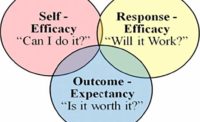How do you keep the faith ...
Do you take vitamin pills everyday? Exercise regularly? Buckle up in the car? If so, why? Many people take vitamin pills religiously, for instance, even though they experience no immediate, obvious benefit. Vitamins are good for us, say physicians and researchers. But most of us don't understand how or why they work. We just keep taking vitamins because we tell ourselves as a rule, it's the right thing to do. We have faith they are good for us. Behavioral scientists call this "rule-governed behavior." We'll abide by a rule because we believe it's good or appropriate, even though we get no immediate payback. We just take the pill, do the exercise, or buckle the safety belt because someone or something convinced us this behavior is worthwhile. Much of what we do for safety and health can be classified as rule-governed behavior. Our efforts to prevent workplace injuries only rarely are followed by immediate rewards. So we need to develop an internal script (or belief system) to keep us going. We need faith. Sacrificing for safety We need faith because asking people to actively care for health and safety means giving up a powerful immediate reward -- the ease, speed, or comfort that often comes from taking risks. In return for extra effort, we promise a bigger reward. Workers will save themselves from a personal injury, or lessen the chances of a coworker getting hurt. Unfortunately, this delayed reward might not seem credible. Who knows when the payoff might occur -- if at all? Most workers don't expect to get hurt on the job. Many don't see how their behavior can put others at risk. Experience most often says you can get away with risky behavior. We need faith for another reason: We'll likely never be able to document that one particular safety practice or process by itself improved our plant's safety record. Who knows what all the contributing factors are?
Building faith
So how do we gain faith that certain behaviors will actually make a difference? How do we maintain our faith that certain work practices and interpersonal communications need to continue? Part of it comes from emotional intelligence (EQ), a subject I discussed here in last October's column. Among other attributes, emotional intelligence is the ability to perceive the benefits that can come by delaying personal gratification. This has been documented in scientific experiments, and EQ competencies can be developed through education, training, and coaching.Who do you believe?
In safety matters, we also put our faith in experts, gurus, authors, and consultants. But which ones should we listen to? Well, how do you decide which vitamin pill to take? Which exercise program to follow? Which diet plan to comply with? Do you rely on slick advertisements? Count on advice from friends or acquaintances? Are product promotions and opinions from friends enough to sustain our faith in a practice that offers only delayed and remote benefits, at best? I don't think so. In the absence of direct, observable benefits, only rigorous, unbiased research can give us the assurance that a certain product should be used or a practice followed. We should use the same logic when selecting a safety process or consulting service. Our faith should be proportional to the amount of scientific research supporting the underlying theory, principles, or procedures. Don't rely too much on case studies, marketing presentations, or benchmarking visits to another company. This is tantamount to selecting medication or a nutrition program on the basis of a promotional flyer or testimony from a friend or acquaintance. Too many safety efforts are based solely on benchmarking experiences, slick marketing campaigns, or personal opinion (referred to as "common sense"). Instead, our faith needs a foundation of systematic, objective, and reliable research. Safety professionals need to look beyond a sales pitch to the relevant scientific literature.Show me the science
Unfortunately, many safety presentations in books, magazines, and at professional conferences come across as personal opinion rather than science-supported conclusions. The key question we should ask a safety consultant is, "What scientific investigation supports the approach you are advocating?" It's not necessary, of course, for consultants to have conducted the empirical investigation themselves, but they should be able to offer substantial scientific justification for their claims. Appropriate research evidence helps develop that belief system (or a supportive mental script) we need to maintain continuous prevention behaviors. So we need to hold safety consultants accountable for convincing us the prevention approach they advocate is scientifically valid.Word of caution
The ultimate accountability check for consultants occurs when the intervention activities implemented are compared with those found to be scientifically valid in the research literature. Now it's possible the process was customized for a particular work culture. And it's likely workplace personnel did not implement preventive procedures exactly as suggested in the scientific literature. In other words, the real-world setting might be quite different than the one in which the intervention process was tested and verified. You can see, then, that it's unfair to hold consultants accountable for final outcomes such as injury reduction. Many things outside the consultant's control -- including personnel changes, layoffs, management policy -- impact the ultimate success of a large-scale intervention. What's critical is that consultant s help a client implement intervention strategies shown to be effective in systematic scientific research. So hold consultants accountable for process variables they can control, not outcomes influenced by factors beyond their domain of influence. If you do this, consultants will focus on implementing valid processes rather than promise results that may or may not be realized. You should make safety experts accountable for promoting, teaching, and implementing intervention procedures that have been empirically verified through scientific investigation. To do this, we need more presentations of scientific evidence, and less marketing talks, bells and whistles, benchmarking visits, and common-sense appeals. Safety professionals must be careful where they place their faith.Looking for a reprint of this article?
From high-res PDFs to custom plaques, order your copy today!




